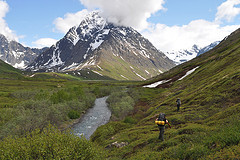
“Peters Creek backcountry beneath Mt. Rumble. Chugach Mountains, Alaska” by Paxson Woelber
Some Rights Reserved
The number of reality shows on Alaska and gold mining seem to grow each season. There’s Gold Rush Alaska, Bering Sea Gold, one on mining under the ice in the Bering Sea during the winter. There are some non Alaska gold mining shows about Guyana. And there are non gold mining shows on Alaska – beyond the fishing and trucking ones, there are a couple of shows on homesteading in Alaska and a new one coming out on people fulfilling their dreams of moving to Alaska.
What’s the draw of these shows? What is it about Alaska, and partially about gold mining that’s appealing to people? Being one of the people these shows appeal to, I can answer from a personal perspective. My work is in developing web sites. Some projects we work on never see the light of day. Securing projects can sometimes seem not related to who the best vendor is, but who can tell the best story. And even when things go perfectly, what you’re building can seem ephemeral. A friend of mine used to work with his father doing brick laying, building patios and bbq pits and what not, just for the satisfaction of physical exhaustion and seeing and touching something you’ve made.
Whether true or the result of careful editing, the many shows about Alaska, and gold mining, weave a narrative that there are places in the world that are still beautiful and wild. Places where people are scarce and community has meaning. And places where there’s something resembling a meritocracy.
On the gold mining shows there seems to almost be a formula of smarts and hard work equaling specific amounts of gold. On shows like Yukon Men and Alaska: The Last Frontier you see people living near subsistence existences, hunting, fishing, gardening and logging, to feed themselves and their families and survive. They learn from elders and neighbors. They plan and work. And if they do what they should when they should they have plenty to eat in the coming months.
There’s no illusion that this is a luxurious life. People live in very small log cabins, tents or trailers (depending on the show). There’s no taking a break and heading out to a restaurant, buying food that you can just heat up and eat, or buying take out. No Internet (gasp), no TV, radio, library or bookstore. Life is very simple. You have to work hard, I don’t think too many people have a lot more than what they need, and I imagine you sleep well at night after working hard.
In comparison to the “real world” where sometimes it feels like you just can’t get ahead, where we live further and further from nature – barely getting to see it, never mind hunting, fishing and gathering, where we’re living on a hamster wheel of work and chores, these shows seem to offer a more authentic life. Your work is not rewarded by direct deposit money that’s passed along by autopay, it’s rewarded with food, shelter, and fuel to keep warm by. More than organic and free range options in the civilized world, you won’t get much closer to your food than growing it, shooting it, or fishing for it, and preparing it once you have it.
It’s certainly tempting, or at least fun to think about while watching these shows and relaxing in the comfort of my suburban home.



